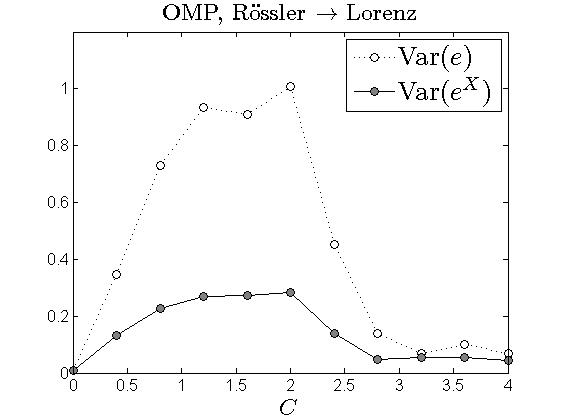Causality testing in reconstructed state spaces by the method of optimized mixed predictions
(Investigators: A. Krakovská, F. Hanzely)
The data that is the subject of causal analysis is often in the form of time series. In such cases, we usually reach for a standard Granger causality test. However, it is based on autoregressive models and can only be successfully used with stochastic, linearly interconnected systems. The method of optimized mixed predictions (OMP), which was developed in this study, also evaluates predictability. In this it is similar to Granger’s original approach. However, OMP works in reconstructed state spaces. To determine whether X causally affects Y, the state space of system Y is reconstructed in two ways: with and without adding information about X. Subsequently, the predictability of system Y in the two spaces is compared (Figure 1). In addition, variations in prediction errors are subjected to statistical testing, thereby estimating the level of significance with respect to the conclusion about the presence of a causal link. The results show that the proposed method makes it possible to detect the presence and direction of binding and can also distinguish causality from ordinary correlation. The OMP draws correct conclusions about causality even in such complicated cases as the interconnection between complex nonlinear systems or apparent causality due to external influences.
Fig. 1: OMP test by whether X (chaotic Rössler system) causally affects Y (chaotic Lorenz system). Shows are variations of the prediction errors of the variable from Y without using and using the X information. Adding the X information improved the prediction, indicating that X causally affects Y.
Related projects:
• VEGA 2/0011/16.
• VEGA–15-0295.
• MAD – Bilateral Mobility Project, SAS-AS CR 15-18.
Publication:
KRAKOVSKÁ, Anna – HANZELY, Filip. Testing for causality in reconstructed state spaces by an optimized mixed prediction method. In Physical Review E, 2016, vol. 94, no. 5, p. 052203. ISSN 2470-0045. (2.252-IF2015).
 Contacts
Contacts Intranet
Intranet SK
SK
